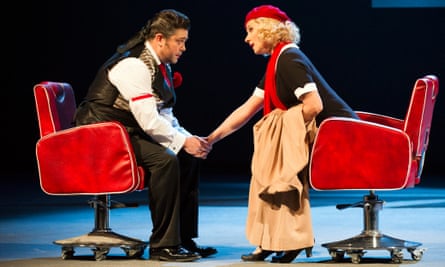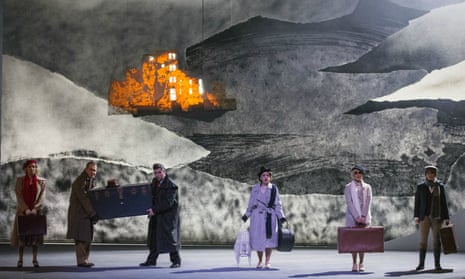This final opera of Welsh National Opera’s Forever Figaro series is perhaps the strongest vindication yet of artistic director David Pountney’s policy of themed seasons. Going for a contemporary sequel to Rossini’s The Barber of Seville and Mozart’s The Marriage of Figaro represents high stakes but, while Count Almaviva loses the remaining family fortune at the casino, Pountney’s gamble pays off.
He himself has written the libretto for composer Elena Langer’s music and also directs. With most of the familiar characters propelled into a recognisably current political instability from which they must flee, the challenge is to make us care about their fate and about them as individuals. That we do is thanks to vivid portrayals and the essential theatricality of Pountney’s concept.
It is more economical of gesture than the preceding Rossini and Mozart stagings, though gains from the momentum established and continues it in the fast-flowing series of tableaux. Ralph Koltai’s designs are also more starkly striking here, and more inventively used. When Angelika gets a letter from Count Almaviva, who she has just discovered is her father, Koltai’s walls swing to enclose her, with the count and the blackmailer who has dictated it on either side.

It is the blackmailing double agent the Major who controls this opera, not David Stout’s Figaro; not, that is, until Figaro pulls the trigger to put a bullet through the Cherub, moniker of the erstwhile Cherubino. The latter’s Master and Maid cabaret, performed with Figaro’s wife Susanna, is a saucy ditty – this updating doesn’t extend to political correctness – and a neat precis of the Count’s masterly ways as evidenced in Mozart’s opera. Pountney’s libretto, in fact, owes as much to Ödön von Horváth’s 1936 play – using his title, snappy if actually a misnomer, as it does to Beaumarchais’ original trilogy, conflating the centuries and allowing sharp resonances.
Langer’s vocal lines are determined by the drama of the libretto: her music is eclectic in style and, while her cold glittery soundscape creates the underlying atmosphere of anxiety and uncertainty, there are long stretches with a much lighter, jazzy spirit, even a bit of tango. Lively instrumentation – injections of accordion and piano – gives cohesion and Justin Brown’s conducting brings a sweeping energy. Nothing is so dissonant as to deter the newcomer, although the schmaltzy feel of the ending grates.
The cast is strong. Alan Oke gives the Major a truly psychopathic edge, Mark Stone’s Count is again excellent, with Elizabeth Watts’ Countess audibly grown in wisdom. But it is Marie Arnet’s brilliant Susanna who stands out. The opera, though not perfect, passes the test of being able to stand alone, but some things don’t change, not least the laws of consanguinity.

Comments (…)
Sign in or create your Guardian account to join the discussion